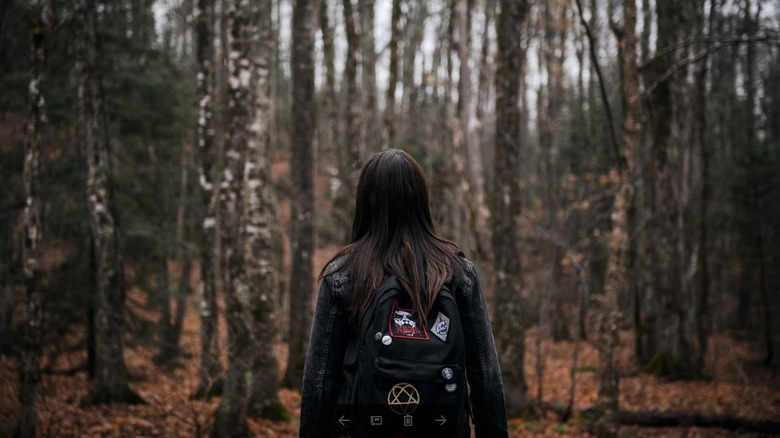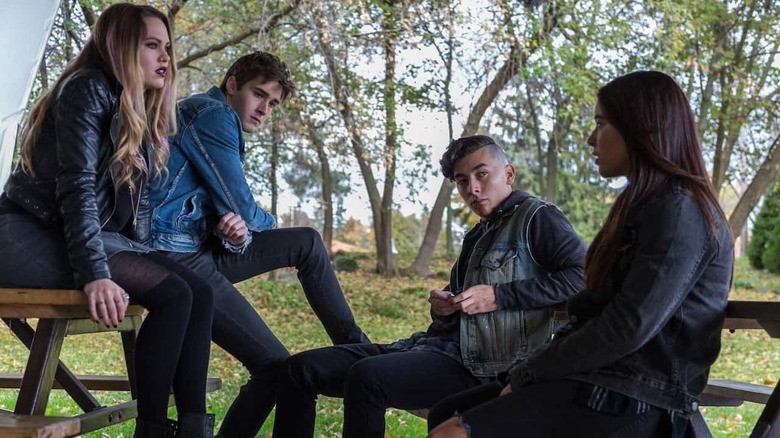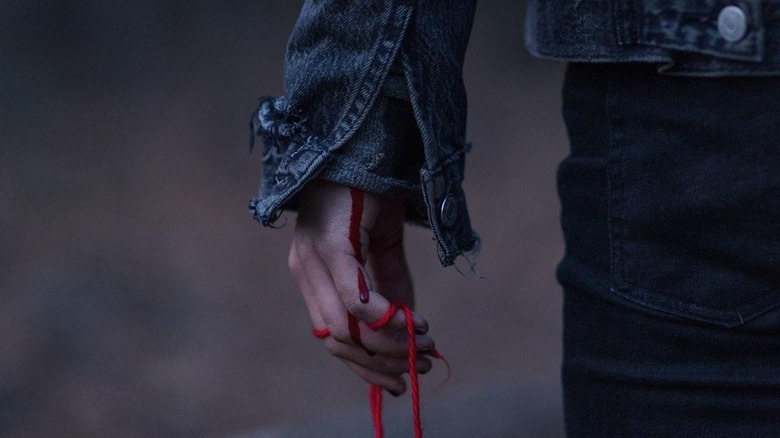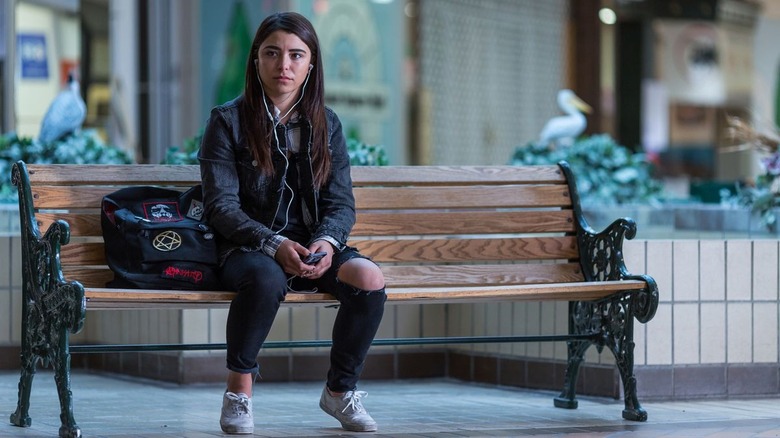The Scariest Scene In Pyewacket Will Haunt Your Dreams
(Welcome to Scariest Scene Ever, a column dedicated to the most pulse-pounding moments in horror with your tour guides, horror experts Matt Donato and Ariel Fisher. In this edition: Matt honors a scare in 'Pyewacket' that deserves to be mentioned alongside 'Heredity,' and Ariel may wind up run out of town.)
Ari Aster's "Hereditary" boasts a scare so mighty it rendered my entire South by Southwest theater paralyzed — when Toni Collette clutches onto the wall above a slumbering Alex Wolff. It's a nerve-shredding sight, and one of two bedroom figures-above-sleeping-characters screams that terrorized the horror genre in 2018. The first one? Adam MacDonald's "Pyewacket," a satanic and headbanging coming-of-age story that is one of my favorite genre films of the entire year. It doesn't present a mirror duplicate of the Collette sequence but earns its right to be mentioned alongside "Hereditary." Possibly even with a "we did it first!"
MacDonald adjacently latches onto the nightmare that is sleep paralysis, which is something I have personal experience facing. Maybe that's why I'm supremely disturbed by today's topic. I've felt the warm nuzzle of an unidentifiable specter with no ability to flinch or spied an indistinguishable figure across the room that I can do nothing but stare down, frozen in time, my appendages held down by invisible forces. "Pyewacket" conveys that helplessness, that hopelessness, and is often forgotten as a satisfyingly spooky horror flick in addition to its emotionally expressive wavelengths.
Summon the Devil, pray you only get the horns.
The Setup
Leah Reyes (Nicole Muñoz) is your average rebellious teenager with metal-goth overtones, except with more grief. Leah's father has passed, and her mother (played by Laurie Holden from "The Walking Dead") abuses alcohol as a coping mechanism. Leah's obsession with occult rituals and curses labels her an outcast to most, down to her adoration of celebrity dark arts personality Rowan Dove (James McGowan). Leah's retreated about as far as any child can under the circumstances, and then Mrs. Reyes drops a bombshell — they're moving into the country.
Leah's reaction is that of any hormonal, emotionally traumatized adolescent who doesn't understand that actions have consequences — she becomes a spellcasting hellbender. In her mind, it's her only option. Leah calls upon the demon Pyewacket to punish her mother, making a pact with the underworld just because she can't live close to her friends or crush anymore. Mrs. Reyes is labeled selfish, monstrous, and oppressive by her angsty daughter and now must face the ultimate payback, which Leah quickly regrets.
The Story So Far
After Mrs. Reyes bares her broken soul during drunken red wine binges, and Leah revolts against her mother's wishes to abandon their home filled with memories of their fallen third, "Pyewacket" becomes a demonic thriller. In woodland isolation, to boot.
Leah ties some strings, spills blood, and calls upon the shapeshifting Pyewacket from whence only evil comes. There's no moral hesitation in her juvenile decision-making, but Leah doesn't know if the backyard magic works. Maybe, secretly, she hopes Pyewacket doesn't appear.
It's not long before Leah begins to notice odd happenings around their new woodland home. Eerie noises and thuds coming from the attic. Sloppy piles of dirt collect, haphazardly.
Leah and Mrs. Reyes mend their relationship ever so gently because isn't that the outcome of most teenage outbursts? Parents do something "unfair," a child lashes back with something extreme like "I HOPE YOU DIE," and everyone's eating pizza the next day like nothing ever happened. The only problem is, there's no stopping the Devil's henchmen once they're called to action.
The Scene
One night, Leah passes out in bed with her light on, which Mrs. Reyes lovingly flips to darkness having reconciled most of their mutual aggravation. Night falls, and the camera pans over darkness outside, then onto the shadow of Leah's window frame where an inky figure rises. The camera cuts to Leah still asleep, then back to the bedroom's farthest corner where a blackish mass now exists, pressed into the union of ceiling and wall. It's hard to decipher what's causing the splotch before another edit cuts to snoozy Leah and back once again.
Then the outline moves.
More accurately, the pitch-black thing allows legs to drop as if the definitionless being is a human form sitting on a perch, and we're witnessing the lower half unfold.
The camera cuts to Leah once more in the same position, blissfully unaware of the possible invader that's hovering, spying from not far enough away.
MacDonald is rather genius by keeping a tight shot on Leah because our anxiety spikes without the ability to track the alien movement. Maybe our eyes are deceived without electrical illumination, or perhaps Pyewacket has chosen its night to strike. In either case, it's impossible to ease our minds because the threat exists out of eyesight.
Another perspective flip makes clear the thing in question is foreign and wants to inspect Leah in close proximity. The shot selection keeps Leah's body in the frame as Pyewacket first rises into a standing position, then lurks with heavy, sluggish steps towards the foot of Leah's bed. Once it's close enough, the camera once again pulls in on Leah's face as the shadows thicken to suggest Pyewacket is looming right over the girl's bedside. Nothing that Leah acknowledges, beholds, or remembers because, when we're asleep, our guard is non-existent.
That is, no contest, the scariest thought imaginable.
The Impact (Ariel's Take)
I'm about to write something that will, beyond a shadow of a doubt, anger several people. Many, in fact. But, alas, it's part of the job.
This scene didn't scare me.
"Pyewacket" had been talked up to and around me for ... well, years. Since its release. So this was my first time watching the movie, and it came with very very high expectations that perhaps doomed it. For me. Is it a good movie? Absolutely. Are there scary scenes? For sure, no question. This just wasn't it for me.
But I understand the dread and terror Matt references. I have the good fortune of never experiencing night terrors. I've briefly referenced something similar, I suppose, in relation to "Arachnophobia," but it's not the same. I can't fathom what that experience is like for Matt, and, subsequently, how terrifying this scene must be for him. And others like him!
While "Pyewacket" as a whole didn't really scare me in the conventional sense, it did still resonate with me. The mind of a grieving teenager is a fragile one, and it's largely fuelled by a kind of righteous omniscient fallacy coupled with a sense of abject isolation. And the two don't mix! You're all impulse, rage, and pain with bursts of joy and fleeting moments of self-control. It's intoxicating. But it can lead to a lot of harm that's hard to come back from, and truly irreparable damage.
The way Leah questions her sanity and the very nature of reality as it pertains to her is horrifying to me. So as much as this scene is understandably frightening, it's the movie's underbelly that keeps me up at night.



